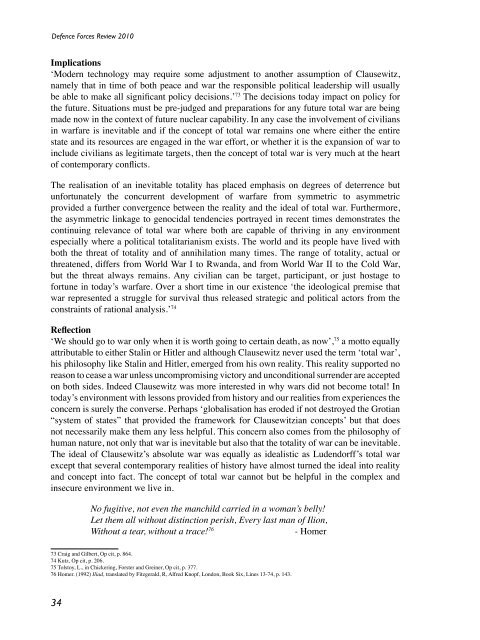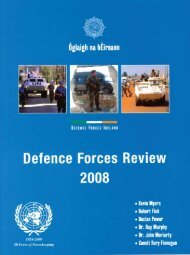Defence Forces Review 2010
Defence Forces Review 2010
Defence Forces Review 2010
Create successful ePaper yourself
Turn your PDF publications into a flip-book with our unique Google optimized e-Paper software.
<strong>Defence</strong> <strong>Forces</strong> <strong>Review</strong> <strong>2010</strong>Implications‘Modern technology may require some adjustment to another assumption of Clausewitz,namely that in time of both peace and war the responsible political leadership will usuallybe able to make all significant policy decisions.’ 73 The decisions today impact on policy forthe future. Situations must be pre-judged and preparations for any future total war are beingmade now in the context of future nuclear capability. In any case the involvement of civiliansin warfare is inevitable and if the concept of total war remains one where either the entirestate and its resources are engaged in the war effort, or whether it is the expansion of war toinclude civilians as legitimate targets, then the concept of total war is very much at the heartof contemporary conflicts.The realisation of an inevitable totality has placed emphasis on degrees of deterrence butunfortunately the concurrent development of warfare from symmetric to asymmetricprovided a further convergence between the reality and the ideal of total war. Furthermore,the asymmetric linkage to genocidal tendencies portrayed in recent times demonstrates thecontinuing relevance of total war where both are capable of thriving in any environmentespecially where a political totalitarianism exists. The world and its people have lived withboth the threat of totality and of annihilation many times. The range of totality, actual orthreatened, differs from World War I to Rwanda, and from World War II to the Cold War,but the threat always remains. Any civilian can be target, participant, or just hostage tofortune in today’s warfare. Over a short time in our existence ‘the ideological premise thatwar represented a struggle for survival thus released strategic and political actors from theconstraints of rational analysis.’ 74Reflection‘We should go to war only when it is worth going to certain death, as now’, 75 a motto equallyattributable to either Stalin or Hitler and although Clausewitz never used the term ‘total war’,his philosophy like Stalin and Hitler, emerged from his own reality. This reality supported noreason to cease a war unless uncompromising victory and unconditional surrender are acceptedon both sides. Indeed Clausewitz was more interested in why wars did not become total! Intoday’s environment with lessons provided from history and our realities from experiences theconcern is surely the converse. Perhaps ‘globalisation has eroded if not destroyed the Grotian“system of states” that provided the framework for Clausewitzian concepts’ but that doesnot necessarily make them any less helpful. This concern also comes from the philosophy ofhuman nature, not only that war is inevitable but also that the totality of war can be inevitable.The ideal of Clausewitz’s absolute war was equally as idealistic as Ludendorff’s total warexcept that several contemporary realities of history have almost turned the ideal into realityand concept into fact. The concept of total war cannot but be helpful in the complex andinsecure environment we live in.No fugitive, not even the manchild carried in a woman’s belly!Let them all without distinction perish, Every last man of Ilion,Without a tear, without a trace! 76- Homer73 Craig and Gilbert, Op cit, p. 864.74 Kutz, Op cit, p. 206.75 Tolstoy, L., in Chickering, Forster and Greiner, Op cit, p. 377.76 Homer. (1992) Iliad, translated by Fitzgerald, R, Alfred Knopf, London, Book Six, Lines 13-74, p. 143.34
















